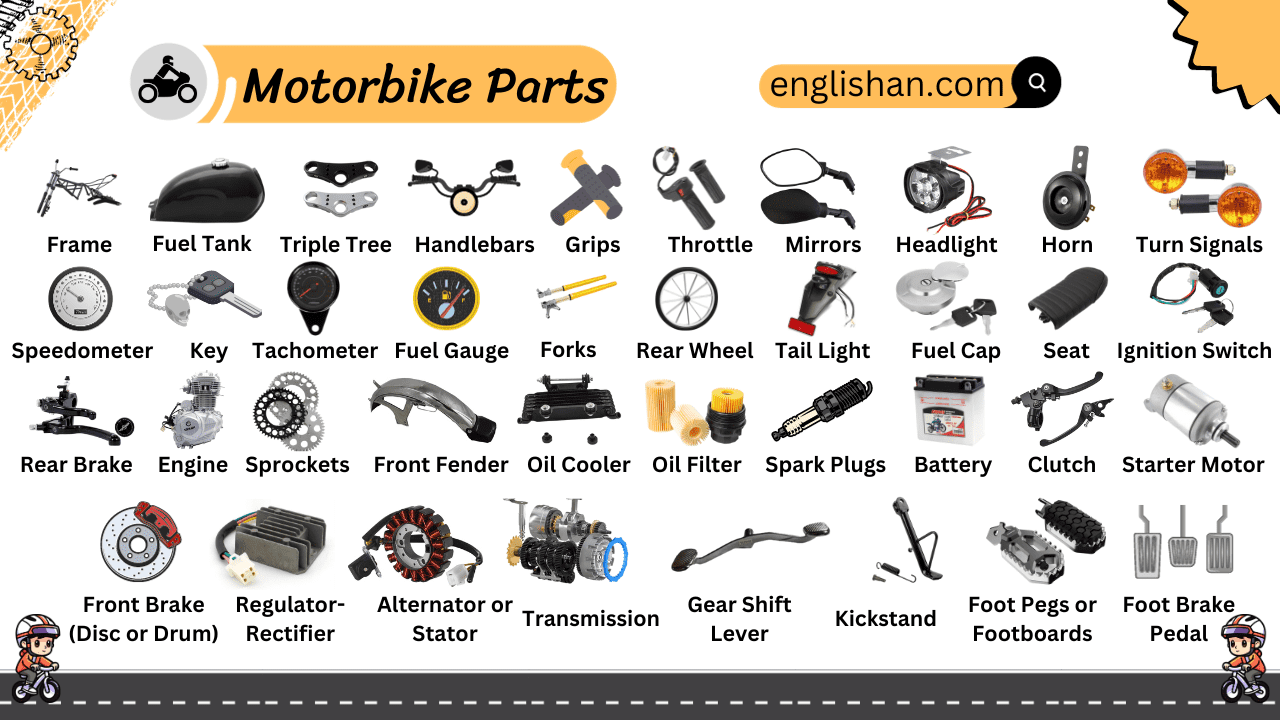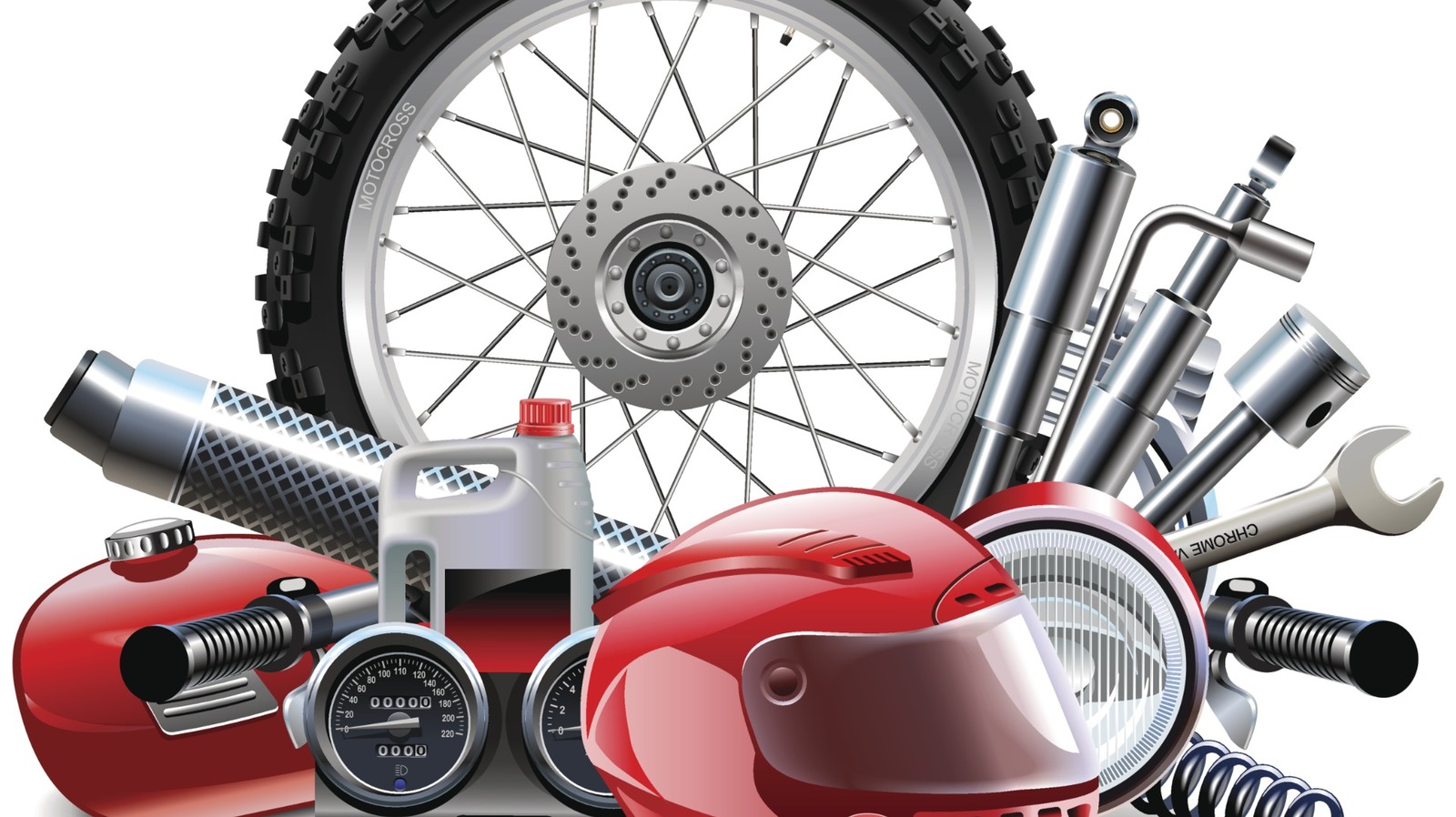Why Riders Trust Only Dealer-Certified OEM Parts New Zealand for Long-Term Value
Why Riders Trust Only Dealer-Certified OEM Parts New Zealand for Long-Term Value
Blog Article
Discover the Essential Motorcycle Components You Need for Optimal Performance
Recognizing the crucial parts of a motorcycle is fundamental for achieving peak efficiency. Each component, from the engine to the braking system, plays a vital duty in total functionality and security. Normal maintenance can avoid unexpected failures and boost the riding experience. Lots of motorcyclists neglect the ins and outs of these systems. Uncovering exactly how they work together can lead to a more efficient ride. What vital elements should every cyclist prioritize?
The Engine: The Heart of Your Motorbike
The engine functions as the core component of a bike, driving its efficiency and defining its capabilities. It is accountable for transforming gas right into power, which powers the bike ahead. Numerous sorts of engines are used, including single-cylinder, V-twin, and inline arrangements, each offering unique attributes matched for different riding objectives and designs. The engine dimension, generally gauged in cubic centimeters (cc), considerably influences efficiency, with bigger engines usually giving even more power and torque.Furthermore, the engine's layout and technology, such as fuel shot systems or air-cooling versus liquid-cooling, affect effectiveness and integrity. Maintenance is crucial for peak operation; elements like regular oil modifications and monitoring ignition system warranty durability. Motorcyclists often consider an engine's responsiveness and level of smoothness, as these attributes enhance the total riding experience. Ultimately, the engine continues to be a critical component that defines not just the motorcycle's efficiency however also the cyclist's connection to the maker.
The Transmission: Shifting Gears Efficiently
The transmission plays a vital duty in a motorcycle's performance, particularly in the mechanics of gear changing. Recognizing exactly how to change equipments efficiently can enhance the total riding experience, while regular upkeep guarantees peak performance. Correct focus to these elements can substantially influence the longevity and performance of the bike.

Equipment Shifting Mechanics
Smooth gear shifting is vital for suitable motorcycle performance, considerably impacting both acceleration and control. The mechanics of equipment shifting entail the interaction between the clutch, gear lever, and transmission system. When a rider engages the clutch, it disengages the engine from the transmission, permitting for a gear adjustment without damaging the elements. A well-timed launch of the clutch, combined with accurate motion of the gear bar, facilitates a smooth change between equipments. This process assures that the engine runs within its best power band, improving efficiency. Bike Parts Wellington. Furthermore, recognizing the equipment ratios and their impact on rate and torque can aid riders make informed options throughout changes, inevitably adding to a more responsive and pleasurable riding experience
Upkeep Tips Significance
Regular upkeep plays an important role in ensuring that the transmission system operates efficiently, permitting smooth gear shifts. On a regular basis inspecting and altering the transmission liquid is essential, as old liquid can result in boosted friction and wear. Additionally, examining the clutch for wear assurances peak interaction and disengagement, avoiding slippage during equipment adjustments. Lubrication of relocating components is similarly vital to minimize friction and improve performance. Motorcycle proprietors must likewise keep track of for leaks and uncommon sounds, as these can suggest underlying issues. By sticking to these maintenance tips, bikers can lengthen the lifespan of their transmission system, assuring that gear changes continue to be smooth and contributing to the total efficiency of their motorcycle.
The Braking System: Ensuring Security on Every Ride
Braking systems are essential elements that straight affect a motorcycle's safety and security and efficiency. They contain different components, including brake pads, blades, calipers, and hydraulic lines, all interacting to ensure effective slowdown. The sort of stopping system-- normally either disc or drum-- affects responsiveness and quiting power.Regular maintenance is important to copyright peak efficiency; used brake pads can bring about reduced effectiveness and enhanced stopping ranges. Additionally, the top quality of brake fluid need to be kept an eye on, as it can soak up moisture with time, endangering stopping efficiency.Riders need to likewise take into consideration the significance of anti-lock stopping systems (ABDOMINAL), which protect against wheel lockup during abrupt quits, improving total safety. Correctly functioning brakes are not practically stopping; they impart self-confidence in the rider, enabling for more secure navigation with numerous terrains. Inevitably, a trustworthy stopping system is essential for taking pleasure in every ride with peace of mind.
The Suspension: Enhancing Comfort and Control
A well-functioning shock absorber substantially adds to a motorcycle's total efficiency, complementing the efficiency of the braking system. The suspension plays a significant duty in soaking up shocks from irregular surface areas, guaranteeing a smoother ride while maintaining tire call with the road. This get in touch with is essential for both security and control, allowing riders to navigate edges with confidence and precision.Different kinds of shock absorber, such as telescopic forks or mono-shocks, use varying levels of comfort and handling. Correctly tuned suspension improves responsiveness, offering the cyclist with a more linked feel to the motorcycle. Regular upkeep checks are important to determine the suspension parts, including springs and dampers, are working at their ideal. An effective shock absorber not just raises the riding experience but additionally adds to the longevity of various other motorcycle parts by minimizing damage. As a result, buying quality suspension is essential for any type of serious motorbike enthusiast.
The Tires: Linking You to the Roadway
Tires play an important role in a motorcycle's efficiency, serving as the main web link between the roadway and the motorcyclist. Comprehending the different types of tires offered can greatly impact taking care of and security. Additionally, normal maintenance is crucial to guarantee peak tire performance and long life.
Tire Types Explained
Just how do various tire types influence a motorbike's efficiency? Tire kinds play an essential duty in determining a motorbike's stability, handling, and grip. Sport tires, developed for high efficiency, deal enhanced traction and responsiveness on paved roadways, making them ideal for racing and aggressive riding. Alternatively, touring tires prioritize toughness and convenience, giving a smoother trip for long-distance travel. Off-road tires, defined by their tough tread patterns, master traction on unpaved surfaces, appropriate for experience fanatics. Furthermore, dual-sport tires mix attributes from both on-road and off-road categories, dealing with flexible riding requirements. Eventually, choosing the best tire kind is essential for optimizing efficiency, ensuring safety, and enhancing the overall riding experience.
Upkeep Tips Offered
While riding on the road, keeping perfect tire problem is essential for safety and security and efficiency. On a regular basis inspecting tire pressure is very important, as under-inflated tires can result in inadequate handling and enhanced wear. It is recommended to inspect step deepness often; worn tires concession grasp and security. In addition, riders need Full Article to look for signs of damages, such as lumps or fractures, which can indicate the demand for substitute. Turning tires periodically assures also use, enhancing long life. Maintaining tires clean from particles and avoiding excessive visuals can prolong their life-span. Maintaining proper positioning and equilibrium adds to come to a head performance, decreasing stress and anxiety on other bike components. Complying with these upkeep tips will considerably boost the overall riding experience.
The Fuel System: Fueling Efficiency and Effectiveness
The gas system plays a crucial role in taking full advantage of a motorbike's efficiency and performance, as it guarantees the optimum distribution of gas to the engine. It makes up several critical components, including the gas container, gas pump, gas filter, and gas injectors or carburetor. Each part should work successfully to guarantee a smooth and powerful ride.The fuel storage tank stores fuel and provides it to the engine using the gas pump, which produces the essential stress. A gas filter protects against impurities from entering the engine, while the injectors or carburetor mix gas with air for combustion.Proper maintenance of the gas system is essential; a blocked filter or malfunctioning injector can cause reduced efficiency and boosted gas usage. By validating that the gas system runs effectively, riders can delight in enhanced throttle reaction, better gas economic situation, and on the whole boosted riding experience.
The Electrical System: Powering Your Trip
An effective electrical system is essential for the general capability and security of a motorbike, as it powers important parts such as the ignition, lights, and different electronic systems. This system includes the battery, which stores power, and the generator, in charge of generating power while the engine runs. The wiring harness attaches these parts, making sure reputable power distribution.Additionally, merges safeguard the system from overloads, while relays help regulate high-current tools with low-power signals. A properly maintained electric system enhances efficiency by making certain smooth begins and consistent procedure of signals and lights, important for rider presence and safety.Regular checks of the battery's charge and links are necessary for preventing electrical failings. Bikers should additionally examine electrical wiring for wear and tear, making certain all components operate ideally. Inevitably, a robust electric system this link adds considerably to the overall efficiency and integrity of the motorbike.
Regularly Asked Concerns
Just how Frequently Should I Change My Motorcycle's Battery?
The regularity of motorcycle battery replacement relies on usage and upkeep (Motorcycle Parts Auckland). Usually, batteries need to be replaced every 3 to 5 years. Regular checks can aid identify when a replacement is needed for peak performance
What Devices Do I Required for Basic Motorcycle Maintenance?
For standard motorcycle maintenance, one needs necessary tools such as a socket set, wrenches, screwdrivers, pliers, tire stress gauge, and a torque wrench. These tools assist in efficient upkeep and guarantee the motorcycle runs efficiently and securely.
Exactly How Can I Boost My Motorcycle's The rules of aerodynamics?
To boost motorcycle aerodynamics, one must consider changing fairings, using windscreen expansions, maximizing body setting, and decreasing overall weight. These modifications assist lessen drag, improving security and fuel efficiency throughout adventures.
What Are the Indications of a Failing Electrical System?
Indications of a stopping working electrical system include dimming lights, difficulty starting, uneven instrument analyses, and blown integrates. Bike Parts Wellington. Uncommon smells or rust around battery terminals may also show underlying problems needing immediate attention for security and efficiency

How Do I Choose the Right Oil for My Motorcycle?
When picking oil for a motorbike, one need to think about the producer's requirements, viscosity scores, and the kind of riding. Additionally, conventional versus artificial oil can impact efficiency and engine defense, affecting the decision significantly. The engine size, commonly measured in cubic centimeters (cc), substantially influences performance, with bigger engines generally offering even more power and torque.Furthermore, the engine's style and technology, such as gas shot systems or air-cooling versus liquid-cooling, influence effectiveness and reliability. A well-functioning suspension system considerably contributes to a motorbike's overall efficiency, matching the efficiency of the stopping system. The fuel system plays a vital function in taking full advantage of a motorbike's efficiency and performance, as it assures the optimum shipment of fuel to the engine. A fuel filter avoids pollutants from getting in the engine, while the injectors or carburetor mix fuel with air for combustion.Proper maintenance of the fuel view publisher site system is critical; a clogged filter or malfunctioning injector can lead to reduced efficiency and boosted fuel intake. A properly maintained electrical system improves efficiency by guaranteeing smooth beginnings and consistent procedure of lights and signals, vital for motorcyclist exposure and safety.Regular checks of the battery's cost and links are essential for stopping electric failures.
Report this page